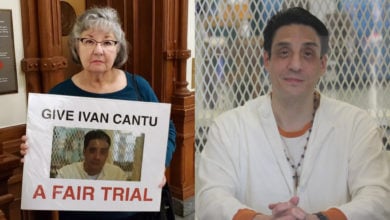On Feb. 29, more than a thousand Chinese residents, workers and business people gathered in San Francisco’s Chinatown to send a “positive rally for hope” to show support for the Chinese community as fear of a viral outbreak has led to increased anti-Chinese racism and a significant drop in business to Chinatown.
The event was organized by a broad coalition of organizations, including the Chinese Consolidated Benevolent Association, Chinese Americans for Peace, Chinese for Affirmative Action, Chinese Chamber of Commerce, and the ANSWER Coalition. Rally speakers urged San Franciscans to “fight the virus, not the people” followed by a thousand-person march through the streets of Chinatown to Union Square.
Fears of the coronavirus have spread through the U.S. with the first patient dying in Washington State on Feb. 28. The outbreak first occurred in Wuhan, China, and while the origin of the virus is still unknown, it has spread to over 55 countries including Italy, South Korea, and Japan. COVID-19 is 20 times deadlier than the flu and has a 3-14 day incubation period that makes it difficult to detect.
Rather than an outpouring of support and unity with Wuhan, many in the West have become fearful of Chinese people themselves based on Western media campaigns that blame the Chinese government for the virus and the spreading of rumors based on racist caricatures of Chinese people.
Rally attendee Rose Chung and Jung Family Association president explained why she had come to the rally:
“We need to remove the fear. That’s the greatest danger. It’s causing so much racism and xenophobia. We are being victimized. It could just be anywhere. I could be walking somewhere, they could give me a look. It’s time for us to come together and come out stronger.”
Attendee Richard Lam and semi-retired communication technology worker emphasized how fear of the virus had impacted the Chinatown business community: “I want to support Chinatown and merchants. With the virus scare, rumor and speculation are hurting the business in Chinatown.”
In San Francisco, 21 percent of the population is of Chinese descent. Although many Chinese people work outside of Chinatown, it continues to be an important cultural and economic center for the community.
One speaker said:
“As a fourth-generation San Franciscan Chinese American, I know the Chinese community is strongest when we stick together. San Franciscans, we are better than this, we are bigger than this. Together, we can keep people safe, and we can also have a healthy economy. I am asking people to be united, and not be divided by fear.”
New York Chinatown reported that business dropped 50-70 percent due to the virus scare. After COVID-19 spread to South Korea, LA’s Koreatown reported a similar drop in business. This racist response to the virus does not help contain it, but effective public health policy does.
China’s lead expert on COVID-19 predicted the disease will be contained in China by late April. As of Feb. 26, the number of new COVID-19 infections was higher outside of China than inside China. China’s public health response to the disease using science, public policy and enforcement demonstrates how the virus can be defeated. For example, China built hospitals, enforced quarantines, and supported workers in taking time off and paying for their health care.
As attendee and hotel worker Particia Shu said:
“I am pro-curing-the-disease. It’s a human problem, not a Chinese problem. Wuhan has a lot of dead. We all feel sad about it. We want to get together and give strength to each other. Everybody has some fears. People are scared to go to Chinatown. We want to let people know, Chinatown is not a disease.”
Julie Tang, a key organizer of the rally and retired judge, said:
“We do not want racial profiling. We do not want fiscal assault on our people. We do not want bullying on our children. We do not want verbal abuse. We do not want denial of access to public transportation and public facilities.”
Speaking on efforts to fight the virus, Tang said:
“We also recognize Wuhan, China, for the amazing work they have done. The hospital workers, the staff, the doctors, who have treated hundreds of thousands of people, and self-sacrificed their liberty by keeping themselves confined so that we will not get infected. They succeeded in delaying the illness being spread. We have to give them support and thank them for their determination to kick the virus and prevent the world from catching on.”
Signs throughout the march emphasized these themes: “Wuhan, you are not alone”; “The virus is our enemy, not China”; “United we stand together”; “Health, not politics”; “Time for facts, not fear”; “Time for science, not rumors”; “Chinatown: open for business”; and “Reject fear and racism.”
Many speakers touched on the role of the media in increasing fear and anti-Chinese racism.
Vincent Pan of Chinese for Affirmative Action said:
“We are here to fight the coronavirus, but we are also here to fight bigotry, which can infect all of us. For the last several years we’ve been conditioned to fear, misunderstand and even hate all those who are different. Maybe because of their religion, the way they look, or because of who they choose to love. Let this be a moment for all to unite, not only to fight the coronavirus, but to fight all forms of bigotry.”
Tang said:
“For the last two years, the newspapers have been doing a lot of anti-China bashing. A lot of that fallout affects Chinese-Americans. … We have to know what the truth is, we cannot let the media tell us what the truth is. No one can tell us that we cannot speak up. Fight the virus, not the people!”






